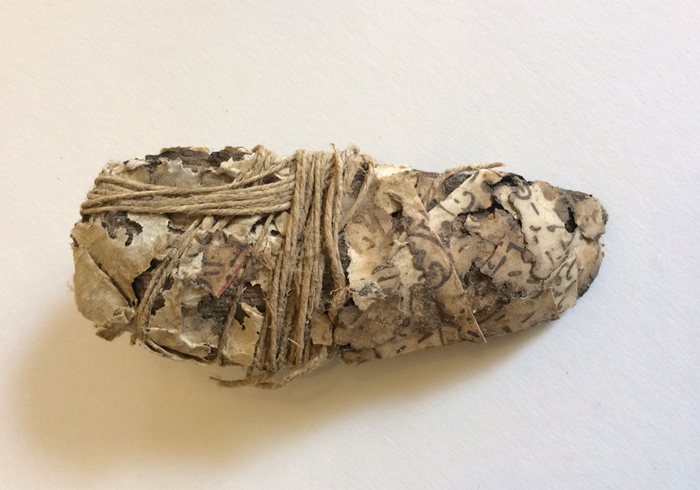I first encountered the work of veteran artist Khalil El Ghrib at AL MAQAM Art Residence in Tahanaoute, a village near the Atlas Mountains on the outskirts of Marrakech. It had a little room with a permanent display showcasing El Ghrib’s delicate work. That work comprised little pieces of decomposing objects, made out of bread, paper, etc, that nevertheless projected an allure that drew me to them. A week later, I drove with a friend to Asilah, a nine-hour train journey from Marrakech, to meet the artist. Over a long dinner we discussed everything from his Darwish-like (ascetic) lifestyle to his love of classical Arabic poetry and his devotion to the writer Khalil Gibran; all this via the tale of how he started making art at the age of seven with the encouragement of his family, and the ethics of his art and artmaking. I had yet to encounter a prophet in art, one who lives by what he preaches; El Ghrib was finally it.
Dematerialisation is the essence of his practice. His preoccupation with and advocacy of the death of things, primarily objects, is fascinating. He simply states, “If we humans die, shouldn’t objects die too?” El Ghrib refuses, on principle, to sell his artwork. He is recently retired from a lifetime of teaching history and geography at a local school. He talks about how he has lived a humble life with his family, how he consciously decoupled his love of art from the limits of materiality. He works primarily with impoverished materials that he collects or ‘adopts’ on his daily journey walking the shores of his hometown. He applies minor interventions to the collected ephemera. The results are small sculptures made with bread, string, inscribed paper and other materials that are exposed to time, moisture and oxidation. Despite being dainty and insubstantial, these objects carry a potency: they consolidate life, death, time and obsolescence all at once.
Reem Fadda is an independent curator based in Ramallah, Palestine, and Amman, Jordan. She was previously curator of the 6th Marrakech Biennale and Associate Curator, Middle Eastern Art, for the Abu Dhabi Project of the Solomon R. Guggenheim. Last year she won the Walter Hopps Award for Curatorial Achievement and curated Jerusalem Lives, the inaugural exhibition at the Palestinian Museum in Birzeit on the West Bank.
Khalil El Ghrib lives and works in Asilah. He teaches Arabic in nearby Tangier and rarely exhibits his artistic work. His works were recently included in Marrakech Biennale 6, however, and the Sharjah Biennial 13’s programme at the Sursock Museum, Beirut.
From the January & February 2018 issue of ArtReview, in association with K11 Art Foundation
